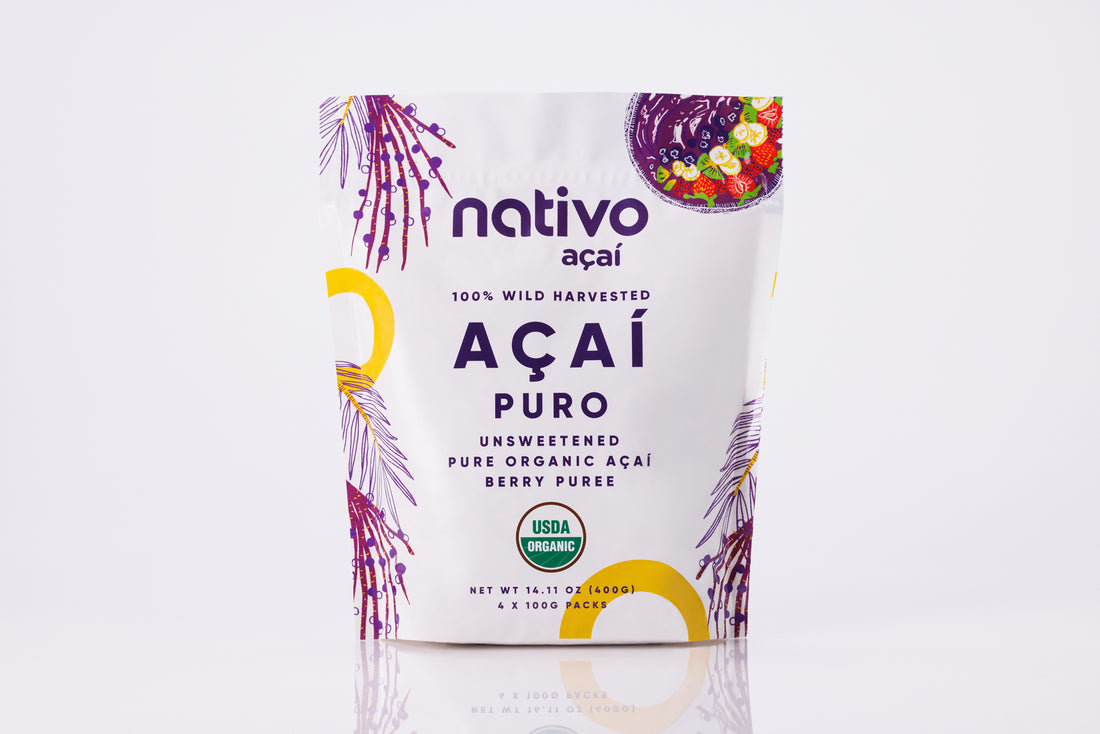Acai berries have gained significant popularity over the past decade, becoming a staple in health-conscious diets worldwide. Known for their rich flavor and vibrant color, acai berries are often touted as a “superfood” due to their dense nutritional content and wide range of health benefits. Whether blended into a smoothie bowl, turned into juice, or taken as a supplement, the acai berry offers an impressive combination of antioxidants, healthy fats, and essential nutrients that promote overall health and well-being.
In this blog post, we’ll take a deep dive into the nutritional benefits of acai, exploring how these small berries pack such a powerful punch and why they deserve a place in your diet.
What Is Acai?
Acai (pronounced ah-sigh-EE) is a small, purple berry that grows on the acai palm tree, native to the rainforests of Central and South America. The berries are roughly the size of grapes and have a dark purple hue when ripe. While they have been consumed for centuries by indigenous peoples in the Amazon, acai berries only became globally recognized in the early 2000s, when they were promoted as a superfood in various health circles.
What sets acai apart from other berries like blueberries or strawberries is its unique nutritional profile. Acai berries contain a higher concentration of certain nutrients and compounds, making them stand out among other fruits.
The Nutritional Profile of Acai
Acai berries are incredibly nutrient-dense, offering a wide variety of vitamins, minerals, and other beneficial compounds in a relatively small serving. Here’s a breakdown of the key nutrients found in acai berries:
**Antioxidants**: Acai berries are rich in antioxidants, particularly anthocyanins, which give the berries their deep purple color. Antioxidants are compounds that help protect the body from oxidative stress and free radicals, which can cause cellular damage and contribute to the development of chronic diseases.
**Healthy Fats**: Unlike most fruits, acai berries contain healthy fats, primarily omega-6 and omega-9 fatty acids. These fats are essential for brain function, heart health, and the absorption of fat-soluble vitamins.
**Fiber**: Acai berries are an excellent source of dietary fiber, which is important for digestive health. A diet rich in fiber can help regulate bowel movements, lower cholesterol levels, and control blood sugar levels.
**Vitamins and Minerals**: Acai berries are a good source of vitamins A, C, and E, as well as minerals like calcium, potassium, and magnesium. These vitamins and minerals play a critical role in maintaining the health of various systems in the body, from the immune system to bone health.
**Low Sugar Content**: One of the unique features of acai is its low sugar content compared to other fruits. This makes it an ideal option for those looking to reduce their sugar intake while still enjoying a nutrient-dense fruit.
The Health Benefits of Acai
Due to its impressive nutritional profile, acai offers a wide range of health benefits. Let’s explore how these nutrients contribute to improving overall health:
1. **High in Antioxidants for Anti-Aging and Disease Prevention**
Acai berries are one of the most potent sources of antioxidants, especially when compared to other fruits. Antioxidants play a critical role in neutralizing free radicals, which are unstable molecules that can damage cells and lead to chronic conditions such as heart disease, cancer, and neurodegenerative diseases like Alzheimer’s.
Anthocyanins, the antioxidants responsible for the berry's deep purple color, have been linked to reducing inflammation, improving cardiovascular health, and slowing down the aging process. Studies have shown that consuming foods rich in anthocyanins may also help protect the skin from oxidative damage, potentially reducing wrinkles and promoting a more youthful appearance.
2. **Boosts Heart Health**
Acai berries contain several nutrients that support heart health, including fiber, healthy fats, and antioxidants. The high fiber content in acai helps regulate cholesterol levels by binding to cholesterol in the digestive system and removing it from the body. This can lower LDL (bad) cholesterol levels, reducing the risk of heart disease.
The healthy fats found in acai, such as omega-9 oleic acid, are also beneficial for heart health. Omega-9 fatty acids are known to help maintain healthy cholesterol levels and improve overall cardiovascular function. Furthermore, the antioxidants in acai can reduce inflammation and oxidative stress, which are major contributors to heart disease.
3. **Supports Brain Health and Cognitive Function**
The antioxidants and healthy fats in acai are not just good for the heart—they’re also beneficial for brain health. Oxidative stress and inflammation are two major factors that contribute to cognitive decline and neurodegenerative diseases like Alzheimer's. The high levels of antioxidants in acai berries help protect brain cells from oxidative damage, potentially improving memory and cognitive function.
In addition, the healthy fats in acai support the structure and function of brain cells, promoting better communication between neurons and enhancing overall brain health. Studies suggest that regular consumption of foods rich in antioxidants and healthy fats can help reduce the risk of age-related cognitive decline.
4. **Aids in Digestion**
Acai berries are a great source of dietary fiber, which is essential for maintaining a healthy digestive system. Fiber helps regulate bowel movements, preventing constipation and promoting a healthy gut. It also supports the growth of beneficial bacteria in the gut, which is crucial for overall digestive health and immunity.
By consuming fiber-rich foods like acai, you can also help manage your weight, as fiber helps you feel fuller for longer periods, reducing the likelihood of overeating.
5. **Promotes Skin Health**
The antioxidants in acai, particularly anthocyanins and vitamins A and E, are known for their skin-boosting properties. These compounds help protect the skin from environmental stressors like pollution and UV rays, which can cause premature aging and skin damage. Acai's anti-inflammatory properties may also help reduce skin irritation and redness, making it a popular ingredient in skincare products.
Moreover, the healthy fats in acai nourish the skin, helping to maintain its moisture barrier and keep it hydrated. Regular consumption of acai can lead to healthier, more radiant skin from the inside out.
6. **Helps with Weight Loss**
Acai berries have gained popularity as a weight loss aid, and while they are not a magic solution, they do offer some benefits that can support weight management efforts. Acai's high fiber content helps promote feelings of fullness, reducing appetite and preventing overeating.
Additionally, the combination of healthy fats, fiber, and low sugar content in acai makes it a great option for those looking to manage their weight while maintaining balanced energy levels. The berry's nutrient density also ensures that your body gets essential vitamins and minerals without an excess of calories.
7. **Boosts Immune System**
Acai berries contain vitamins A and C, both of which are crucial for a strong immune system. Vitamin C is a well-known antioxidant that helps protect the body from infections and promotes wound healing. Vitamin A, on the other hand, plays a role in maintaining the health of the skin and mucous membranes, which are the body's first line of defense against pathogens.
Moreover, the high concentration of antioxidants in acai further supports immune function by reducing oxidative stress and inflammation, both of which can weaken the immune system over time.
How to Incorporate Acai into Your Diet
Acai berries are most commonly available in frozen puree form, as the fresh berries spoil quickly. You can find acai puree in the freezer section of most health food stores, and it’s typically used to make acai bowls, smoothies, or juices. Acai powder is another option, which can be added to smoothies, yogurt, or baked goods for an extra nutritional boost.
To get the most out of acai, try pairing it with other nutrient-rich foods. For example, top your acai bowl with fresh fruits like bananas and berries, along with nuts, seeds, and granola for added crunch and nutrition.
Conclusion
Acai berries are a true nutritional powerhouse, offering a wide range of health benefits thanks to their rich antioxidant content, healthy fats, and essential vitamins and minerals. Whether you're looking to improve heart health, support brain function, or simply enjoy a delicious and nutritious snack, acai is an excellent addition to any diet.
With its low sugar content and high fiber levels, acai is not only a tasty treat but also a smart choice for those looking to maintain a healthy lifestyle.

